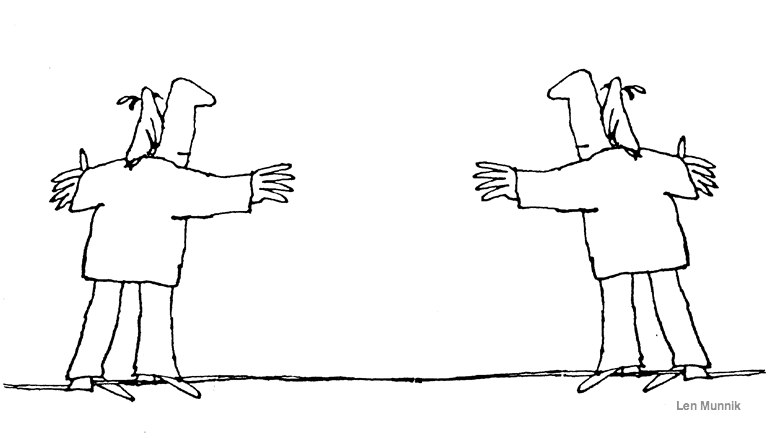I greatly appreciated the wide variety of perspectives in your March issue on the nature of the Divine. As a Friend, I have long been curious about the dialogue we have among us about the mysterious experience that some of us call "God" and some of us prefer to simply call the "Light" or to allow to be nameless. When the dialogue is focused on sharing experience, it can never become argument. Only when it resorts to opinion or the error of thinking that language can ever adequately describe or finalize the phenomenon we are attempting to describe, do we become agitated, like the blind men in the parable of the elephant, by our differences.
The poet Rainer Maria Rilke wrote:
And then the Nameless One beyond guess or gaze.
How do you call it, conjure it?
This way of coupling experience with wonder and inquiry is a delightful way to approach the mystery of the Divine. It keeps the mind open to the never-ending in-pouring of Light and its applications to our lives.
After my husband died in 1996, I found Rilke’s poem "Death Experienced," in which he writes of a beloved:
When you died, there broke onto this stage
A beam of reality straight along the crack
You left by: Green that was really green,
Real sunshine; forests that were real.
This so precisely describes my experience that I often wonder whether "Reality" is not as good a name as any for what we call "God."
Another name Rilke (and others) gives to this experience is "the Void":
Be, and yet know the great Void in which all things begin,
The infinite source of your most intense vibration,
So that, this once, you may give it your perfect assent.
To all that is used up, all the muffled and dumb
Creatures of the world’s full reserve, the unsayable sums,
Joyfully add yourself, and cancel the count.
(from Sonnets to Orpheus; Part II; 13)
And in another of the Sonnets (I; 3), he speaks of the "Nothing" in describing something similar to speaking (or writing) from the Inner Light:
True singing is a different breath. About
Nothing. A gust inside the god. A wind.
To a large degree all language is poetry. In the journey of human beings through history, we individually and collectively name our experiences and hypotheses and convictions and imaginings. Unfortunately, we then get caught up in arguing about our naming, in judging and excluding one another, and even in destroying, especially "in God’s name."
For the sake of thinking, and of speaking with each other, we must name. But our naming is always contextual (no word means the same exact thing in every moment and circumstance and sentence), and no word is ever identical to the "territory" it describes. Furthermore, language is, as Wittgenstein poetically noted, only a ladder with which we can climb in solitude and in dialogue to freshly created formulations and insights. It is useful to let this ladder go. Once-rigidified language is like any institution or ritual or belief; it constrains the infinite reach of mind-in-world.
I have atheist or nontheist friends who are totally at home with "God" in poetry. They know what it means to say, "The world is charged with the grandeur of God; / It will shine out like flaming from shook foil" (Gerard Manley Hopkins), or "Thank you God, for most this amazing day; / for the leafing greenly spirit of trees and the blue true dream of a sky" (e.e. cummings), or "I have said that the soul is not more than the body, / And I have said that the body is not more than the soul, / And nothing, not God, is greater to one than one’s self is" (Walt Whitman).
Good and great poetry accurately describes lived experience and, since it is poetry, we relate to it as metaphor rather than confusing the word with the reality. It enters one’s brain as music and visual art does, bypassing the need for literal accuracy for the sake of some experiential accuracy that "passeth understanding."
When I hear Friends argue about whether true Quakerism requires a belief in God, I am troubled. First of all, what we call "spiritual" experience seems to me to be beyond belief. It is in lived experience that we know. Many children have these moments of knowing. The first one I recall occurred when I was about ten, sitting on the grass in my back yard in Queens. Suddenly, without warning, the universe "poured" in, to borrow another of Rilke’s poetic formulations of the breaking through of reality. I knew immediately that I had been blessed with something that was so certain, it could never be contradicted or argued. And I knew it could not be named. In my feeble attempts to use language, I have said that I was part of everything and everything was part of me, and time and space were infinite or nonexistent, and death was without relevance. Neither the word "belief" nor the word "God" can do justice to such moments.
What is meaningful to us as Friends is that we can gather in silence and allow the Light to break through for us, however that might happen. Our calling is to make an infinite space in which that can happen.


